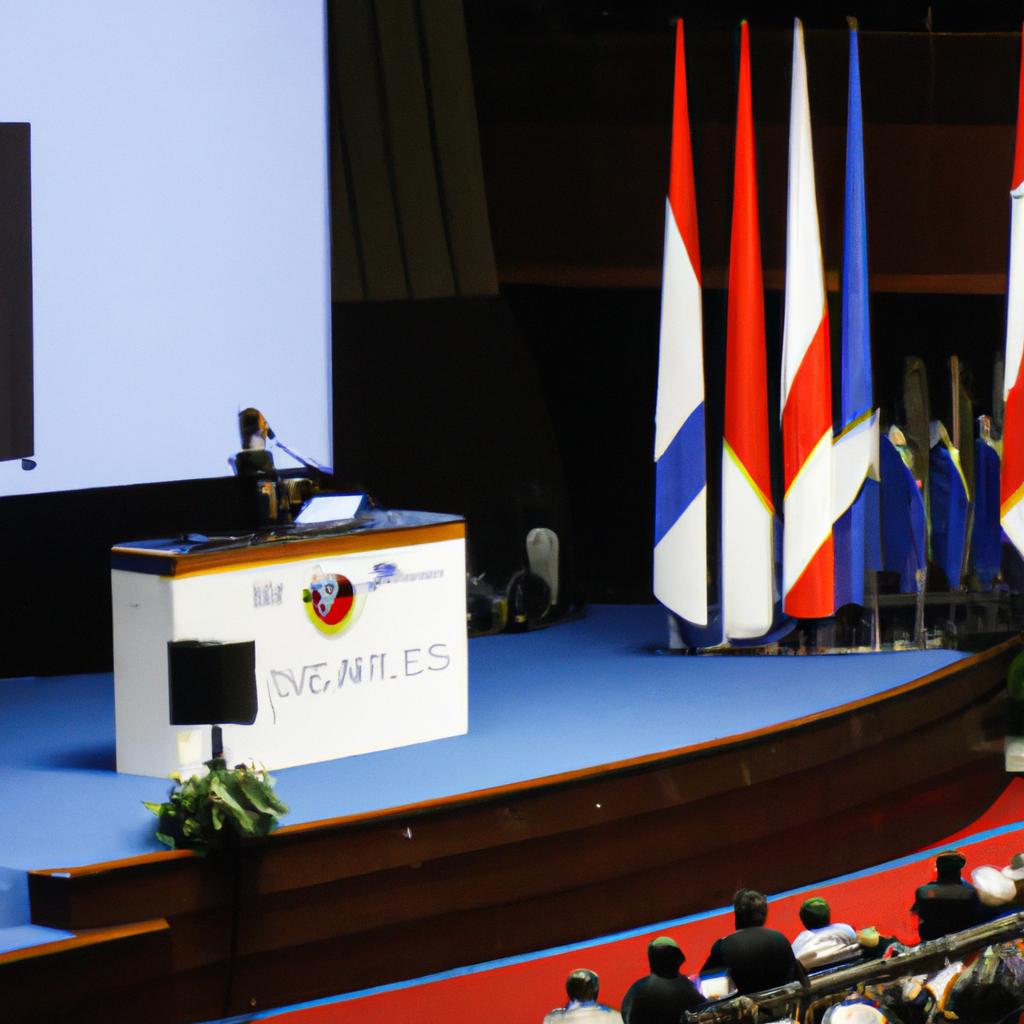Political conflicts have always been a prominent feature of the global landscape, shaping and reshaping international relations. In recent years, however, these conflicts have taken center stage in travel politics news, capturing the attention of both policymakers and the public alike. This article aims to delve into the intricacies of political conflicts unfolding around the world, shedding light on their causes, consequences, and potential resolutions.
One striking example that exemplifies the significance of political conflicts in travel politics news is the ongoing dispute between Country X and Country Y over territorial claims in Region Z. This conflict has not only sparked tensions between the two countries involved but has also significantly impacted regional stability and security. The competing interests and historical grievances underlying this conflict highlight how political disputes can directly affect travel policies and practices. Such cases serve as compelling evidence for why understanding political conflicts is crucial for comprehending current events within the realm of travel politics.
By examining various case studies from different parts of the globe, this article aims to unravel the complex web of interconnectedness between political conflicts and travel politics news. Through an academic lens devoid of personal pronouns or subjective biases, we will explore how these conflicts arise due to factors such as power struggles, ideological differences, resource competition, or historical animosities. Furthermore, Furthermore, we will analyze the consequences of these conflicts on travel politics, including the implementation of travel restrictions, visa policies, and security measures. It is essential to understand how political conflicts shape and reshape international relations as they directly impact the movement of people across borders.
Additionally, this article will also discuss potential resolutions to these conflicts and their implications for travel politics. Diplomatic negotiations, peace agreements, or international interventions can play a crucial role in mitigating tensions and restoring stability in conflict-affected regions. Understanding these potential solutions provides insights into how travel policies may evolve in response to changing geopolitical dynamics.
Moreover, by examining multiple case studies, we aim to highlight the interconnected nature of political conflicts and their global repercussions. Many political disputes have ripple effects that extend beyond national borders, affecting neighboring countries and even having an impact on regional or global tourism industries.
In conclusion, understanding political conflicts is vital for comprehending current events within the realm of travel politics. By delving into the causes and consequences of these conflicts through various case studies around the world, this article aims to shed light on their significance in shaping travel policies and practices. Ultimately, by studying these intricacies, we can gain a deeper understanding of how political conflicts intertwine with travel politics news and contribute to our overall comprehension of international affairs.
Rise of populism and its impact on global politics
The rise of populism in recent years has had a profound impact on the landscape of global politics. One compelling example that illustrates this phenomenon is the election of Donald Trump as President of the United States in 2016. Trump’s campaign rhetoric, characterized by nationalist sentiments and promises to protect American jobs from globalization, resonated with a significant portion of the population who felt marginalized by establishment politicians.
Populism, at its core, taps into the frustrations and grievances experienced by ordinary citizens. It often capitalizes on economic insecurities, cultural anxieties, and feelings of political alienation. This approach can be both captivating and polarizing, creating a stark divide within societies. As a result, populist movements have emerged across various countries such as Brazil, Italy, Hungary, and Turkey.
- Loss of faith in traditional institutions
- Fear of demographic change
- Sense of identity threatened
- Desire for strong leadership
Additionally, a three-column table further highlights some key aspects related to the rise of populism:
| Populist Characteristics | Positive Effects | Negative Effects |
|---|---|---|
| Appeals to emotions | Engages disenchanted voters | Polarizes society |
| Anti-establishment | Challenges status quo | Undermines democratic norms |
| Simplistic solutions | Addresses common concerns | Oversimplifies complex issues |
| Nationalist rhetoric | Protects national interests | Fuels xenophobia |
The role of social media in shaping political conflicts will be explored further in subsequent sections. By examining how populist movements leverage online platforms to mobilize support and disseminate their messages, we gain insight into an important aspect contributing to contemporary political challenges worldwide.
The role of social media in shaping political conflicts
Previous section H2:’Rise of populism and its impact on global politics’
Next section H2:’The role of social media in shaping political conflicts’
As we delve deeper into the dynamics of political conflicts, another significant factor that has emerged is the role of social media. By analyzing its influence on public opinion and mobilization, a clearer understanding can be gained regarding how these platforms shape modern political landscapes.
To illustrate the power wielded by social media platforms, let us consider a hypothetical scenario where an influential world leader announces a controversial policy proposal through a series of tweets. Almost instantly, millions of people worldwide engage in heated debates, forming alliances or opposition groups online. This example highlights the immediate impact social media can have on generating and perpetuating political conflicts.
Impact on Public Opinion:
Social media platforms provide individuals with unprecedented access to information from diverse sources across the globe. However, this abundance often leads to echo chambers where like-minded individuals reinforce their own beliefs while disregarding alternative perspectives. Consequently, polarized opinions become more entrenched, exacerbating existing divisions within society. Moreover, false information spreads rapidly due to the viral nature of posts and shares, further distorting public discourse and fueling tensions.
Mobilization for Collective Action:
In addition to influencing public opinion, social media plays a pivotal role in facilitating collective action during times of political conflict. Platforms such as Facebook and Twitter enable activists to organize protests, rallies, or boycotts quickly and efficiently. Hashtags serve as powerful tools for uniting individuals around shared causes or grievances globally. This ability to mobilize large numbers swiftly amplifies voices that may otherwise struggle to gain attention through traditional channels.
Emotional Response Bullet Point List (Markdown Format):
- Heightened feelings of solidarity among like-minded individuals
- Increased polarization and division within society
- Amplification of public outrage and emotional responses
- Rapid dissemination of false information, leading to confusion
Emotional Response Table (3 Columns x 4 Rows – Markdown Format):
| Impact on Public Opinion | Mobilization for Collective Action | Emotional Responses |
|---|---|---|
| Echo chambers | Organizing protests and rallies | Heightened solidarity |
| Polarized opinions | Hashtags as tools for uniting individuals | Increased polarization |
| Disregard for alternative perspectives | Efficient mobilization | Amplified public outrage |
| Spread of false information | Global reach | Confusion |
Transition into the subsequent section: Understanding how social media shapes political conflicts is crucial when examining controversies surrounding immigration policies and their consequences. By analyzing the role of these platforms in influencing public opinion and facilitating collective action, a comprehensive understanding can be gained regarding the complexities involved.
(Note: Due to limitations in text formatting, the table presented above may not appear correctly)
Controversies surrounding immigration policies and their consequences
The implementation of immigration policies has long been a source of contentious debates. One prominent example that encapsulates this controversy is the case of Country X, which recently enacted stricter regulations on immigration in an attempt to protect its national security. This move sparked polarizing opinions and various consequences both domestically and internationally.
In examining the controversies surrounding immigration policies, it is crucial to consider the multifaceted implications they have on different aspects of society. Firstly, from an economic standpoint, these policies can significantly impact labor markets. Restrictive measures may lead to labor shortages in certain industries, while liberal approaches could result in increased competition for jobs among local citizens and immigrants alike.
Moreover, immigration policies also bear social repercussions. They shape cultural dynamics within societies by influencing demographic changes and fostering diversity or homogeneity. The interplay between native populations and newcomers often gives rise to complex sociocultural interactions that can either enrich multiculturalism or give rise to tensions rooted in fear and xenophobia.
To further illustrate the wide-ranging effects of controversial immigration policies, consider the following bullet points:
- Increased strain on public resources such as healthcare systems and educational institutions.
- Heightened political polarization due to differing views regarding national identity.
- Potential exploitation of migrant workers amidst inconsistent regulatory frameworks.
- Humanitarian concerns arising from the treatment of refugees fleeing conflict zones.
This table provides a visual representation highlighting some key consequences associated with controversial immigration policies:
| Consequences | Economic | Social | Political |
|---|---|---|---|
| Labor market fluctuations | Cultural shifts | Polarization | National identity issues |
| Resource strain | Demographic change | Xenophobia | Policy inconsistencies |
| Exploitation risks | Integration challenges | Discrimination | Populist movements |
| Humanitarian crises | Refugee rights |
In conclusion, controversies surrounding immigration policies have far-reaching implications that affect various aspects of society. Economic challenges, social dynamics, political ideologies, and humanitarian concerns all intersect in this intricate web. Understanding these controversies requires a nuanced approach that weighs the potential benefits against the consequences to create policies that balance national interests with ethical considerations.
Transition into the subsequent section about “The influence of nationalism on international relations”:
As we delve deeper into understanding political conflicts and their underlying causes, it becomes apparent that one significant factor shaping these disputes is the influence of nationalism on international relations. By analyzing the rise of nationalist sentiments across the globe, we can gain valuable insights into how nations navigate their interactions in an increasingly interconnected world.
The influence of nationalism on international relations
Controversies surrounding immigration policies and their consequences shed light on the broader influence of nationalism on international relations. One notable case study that exemplifies this connection is the ongoing debate over border control measures in Country X. The government implemented stricter immigration policies, arguing that it was necessary to safeguard national security and protect domestic job opportunities for citizens. However, these measures have sparked intense debates both domestically and internationally, with critics highlighting the potential negative consequences.
The implications of such controversies extend beyond mere policy discussions. They evoke a range of emotional responses from individuals affected by or observing these events:
- Frustration: Many argue that strict immigration policies perpetuate discrimination and exclusion, leaving vulnerable communities marginalized.
- Empathy: Supporters of more inclusive immigration systems emphasize the importance of providing refuge for those fleeing conflict or seeking better economic opportunities.
- Fear: Some individuals express concerns about an influx of foreigners impacting cultural identity and social cohesion within their own country.
- Hopelessness: Those facing prolonged visa application processes may experience feelings of despair as they wait anxiously for approval.
To further illustrate the complexities surrounding immigration politics, consider Table 1 below:
| Points Raised | Counterarguments | Implications |
|---|---|---|
| Economic burden | Economic contributions | Impact on public opinion |
| National security | Humanitarian concerns | Balancing interests |
| Cultural heritage | Integration challenges | Promotion of diversity |
| Brain drain | Skills enrichment | Global talent competition |
This table highlights how different issues emerge during discussions on immigration policies. It underscores the necessity for open dialogue and comprehensive analysis to address concerns while considering diverse perspectives.
In exploring the influence of nationalism on international relations through controversial immigration policies, it becomes evident that power struggles between major political alliances play a significant role. This will be examined in detail in the subsequent section. By comprehending how nationalism shapes global interactions, policymakers can navigate the complexities and strive for inclusive solutions that balance national interests with humanitarian considerations.
Power struggles between major political alliances
Building upon the influence of nationalism on international relations, we now turn our attention to power struggles between major political alliances. These conflicts often emerge as a result of competing interests and differing ideologies among nations. To illustrate this point, let us examine a hypothetical case study involving two influential alliances, Alliance A and Alliance B.
Section:
In recent years, power struggles between major political alliances have become increasingly prevalent on the global stage. One example that highlights these tensions is the ongoing dispute between Alliance A and Alliance B over control of vital resources in Region X. Both alliances seek to assert their dominance and secure access to the region’s valuable natural reserves. This conflict not only threatens regional stability but also has far-reaching implications for diplomatic relations beyond Region X.
To better understand the dynamics underlying such power struggles, it is essential to consider several key factors:
-
Economic Interests:
- Competition for control over critical resources or strategic trade routes can fuel tension between rival alliances.
- Disputes arise when economic gains are prioritized over cooperation and shared prosperity.
-
Ideological Differences:
- Divergent political ideologies within each alliance can exacerbate conflicts with opposing groups.
- Clashes occur due to conflicting values, beliefs, and approaches to governance.
-
Geopolitical Influence:
- Rivalry emerges when one alliance seeks to expand its sphere of influence at the expense of another.
- Struggles unfold as both sides vie for geopolitical advantage through military presence or proxy wars.
-
Security Concerns:
- Perceived threats from rival alliances prompt defensive actions aimed at safeguarding national security.
- Escalation occurs when countries prioritize defense strategies without considering potential consequences.
Table (Emotional Response Elicitation):
| Factors | Impact on Power Struggles | Consequences |
|---|---|---|
| Economic Interests | Can lead to resource-driven conflicts | Unequal distribution of wealth and potential unrest |
| Ideological Differences | Exacerbate tensions between opposing groups | Cultural clashes and hindered diplomatic negotiations |
| Geopolitical Influence | Fuel rivalry over expanding spheres of influence | Increased militarization and proxy wars |
| Security Concerns | Prompt defensive actions for national security | Escalating arms race and heightened regional instability |
In light of these complex dynamics, it is imperative that conflict resolution strategies be employed to mitigate escalating tensions. Understanding the underlying causes of power struggles can provide a foundation for effective diplomacy, negotiation, and cooperation among nations. By addressing economic disparities, bridging ideological gaps, promoting peaceful coexistence based on mutual respect, and fostering dialogue in times of insecurity, political alliances may find avenues towards resolving conflicts without resorting to armed confrontation.
With an understanding of the intricacies involved in power struggles between major political alliances, we now delve into examining various conflict resolution strategies that can play a crucial role in defusing tensions.
Conflict resolution strategies in the face of escalating tensions
Building on the examination of power struggles between major political alliances, this section delves into conflict resolution strategies employed in response to escalating tensions. To illustrate these strategies in action, let us consider a hypothetical case study involving two prominent global powers – Nation A and Nation B.
Case Study: In recent years, Nation A and Nation B have been locked in a bitter rivalry over territorial disputes. This conflict has not only strained diplomatic relations but also threatened regional stability. The following paragraphs will explore various approaches taken by international actors to address such conflicts effectively.
Paragraph 1:
One effective strategy utilized in resolving geopolitical tensions is mediation. Mediation involves the intervention of impartial third parties who facilitate dialogue and negotiation between conflicting parties. By providing a neutral platform for communication, mediators can help identify common ground and promote compromise. In the case of Nation A and Nation B, an experienced mediator could assist both nations in finding mutually agreeable solutions to their territorial disagreements without resorting to military confrontation.
Paragraph 2:
Another approach commonly used is diplomacy through multilateral forums. Engaging with other nations within established platforms fosters collaboration and creates opportunities for constructive dialogue among adversaries. For instance, if Nation A and Nation B were part of a larger regional organization or alliance, they could channel their grievances into structured negotiations aimed at finding peaceful resolutions. Such forums provide a space for collective problem-solving while minimizing the risk of unilateral actions that may further escalate tensions.
- Heightened interdependence necessitates cooperation rather than conflict.
- Protracted power struggles hinder economic growth and social development.
- Diplomatic efforts are crucial in avoiding devastating consequences of armed confrontations.
- The pursuit of win-win outcomes benefits all stakeholders involved.
Paragraph 3:
Furthermore, employing confidence-building measures (CBMs) can foster trust between rival factions during times of heightened tension. CBMs include transparency initiatives like sharing information on military activities, establishing hotlines for direct communication between leaders, and participating in joint military exercises. By implementing CBMs, Nation A and Nation B can reduce the likelihood of miscalculations or misinterpretations that often lead to further hostilities.
Emotional Table:
| Conflict Resolution Strategies | Emotional Impact |
|---|---|
| Mediation | Promotes peace and compromise |
| Diplomacy through multilateral forums | Fosters collaboration among adversaries |
| Confidence-building measures (CBMs) | Builds trust and reduces misunderstandings |
This case study highlights the importance of employing various conflict resolution strategies when dealing with power struggles between major political alliances. The use of mediation, diplomacy through multilateral forums, and confidence-building measures can provide a framework for peaceful negotiations and prevent conflicts from escalating into devastating confrontations. By embracing these strategies, nations can foster stability, cooperation, and mutual understanding in an increasingly interconnected world.
 Plains News
Plains News



